Last week I was driving along College enjoying a jazzy groove on 90.3 FM Espace Musique. When the song ended and the hosts returned to their banter, I found it strange to hear familiar Toronto neighbourhoods, streets, and venues spoken about in French.
This experience is definitely not restricted to the airwaves. I regularly overhear groups of people speaking French on the street or subway, talking about Toronto. It’s about the hundredth time hear College Street pronounced as “Rue du Collège” that I recognize Toronto as a thoroughly French city.
When you look into Toronto’s history, it makes sense that people would speak of Rue du Collège today. In fact, Toronto’s history is steeped in French. As plaques along the Humber River will remind you, the first Europeans here were French, and the maps they left of the GTA show familiar places covered in French names.
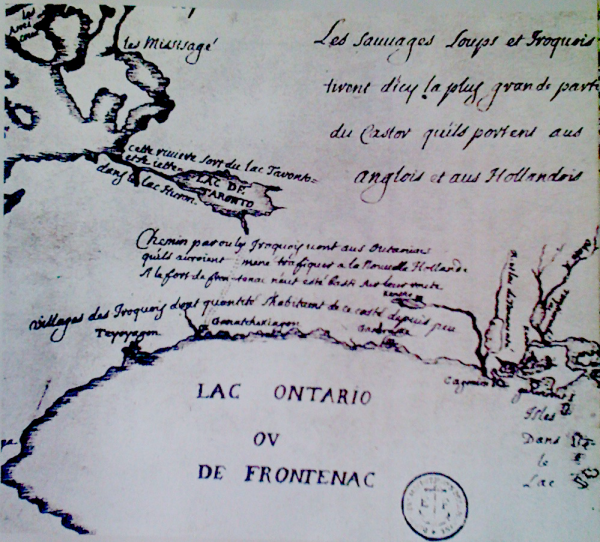
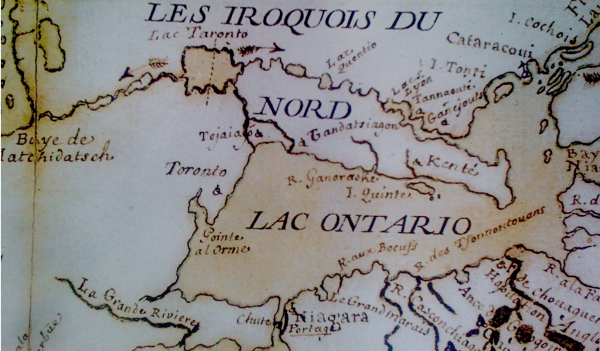
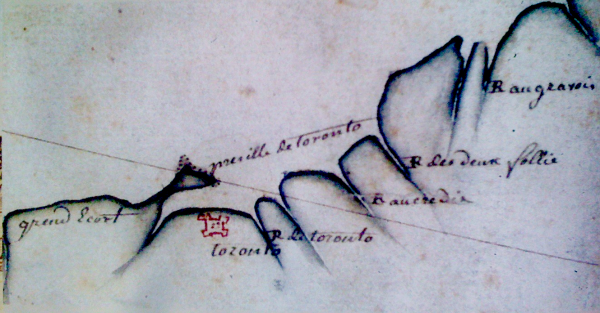
The above maps are from the Historical Atlas of Toronto, by Derek Hayes, a necessary book for the Toronto-curious
Thinking about these old French maps of Toronto, it becomes less surprising to hear about Rue du Collège, or people calling Toronto’s Subway system the Métro, the way they refer to the systems in Paris and Montreal. I actually prefer the French term. Calling it a subway is misleading, as much of the tracks are actually above-ground. You need look no further than LRTs and streetcars to realize that confusing terminology can derail a reasonable conversation about rapid transit.
Recognizing all this Torontonian French history and hearing French heard on the streets and Metro makes me appreciate the significant French contingent in this city. Though Toronto is still reeling from its solid British colonial roots, the latest census lists 1.1.% of the city with French as their mother tongue (compared to 3% Italian, and 2% Portuguese). With roughly 50,000 French speakers in total, an informal survey on Toronto’s streets reveals that all dialects of French spoken worldwide — Quebecois, European French, Francontarian, Acadian, Manitoba-French, African French, Caribbean French, Middle Eastern French — are spoken in Toronto. Where else, other than maybe Paris, Marseille or Montreal, could you find this many ways of speaking la belle langue?
Though the dialects of French in Toronto come from far and wide, they do coalesce in a few places. There’s the Alliance Française, an organization that promotes the use of French language and culture, and Labo, a French arts organization. Toronto’s weekly L’Express newspaper, “le journal français du Grand Toronto” is a venue for the city’s Francophones of all origins.
In the pages of L’Express, Toronto is often called La Ville Reine — the Queen City. Though generally defunct, the nickname keeps our city bonded to its colonial British and puritan roots, and in a tongue and cheek way reminds us of historical rivalries between Toronto and Quebec, back when Montreal was sparkling city number one, and down the 401, Toronto the Good was simmering on dull.
Maybe it’s these past rivalries, and their continued manifestations today, that keep Toronto from fully embracing its French soul.
For one thing, our streets aren’t lined with Dépanneurs (Quebec’s version of the convenience store), where you can buy your groceries, cleaning products, wine and beer all in the same place. For now, Toronto only has one Depannuer — on Rue du Collège. While not quite the same (it’s a restaurant), this Deppaneur certainly carries the spirit of Quebec into Toronto.
The pilot program to put LCBO kiosks in 10 grocery stores is a good start, but here’s hoping that Toronto will take the cues from its thoroughly French past and present, and at some point, let its convenience stores sell beer.
Daniel Rotsztain is the Urban Geographer. Check out his website or say hello on Twitter!

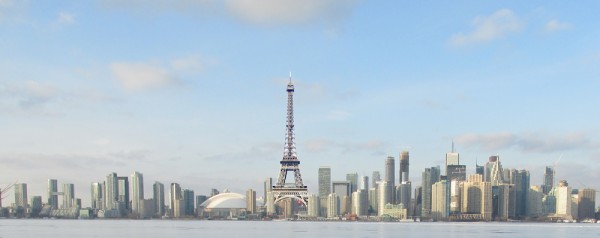
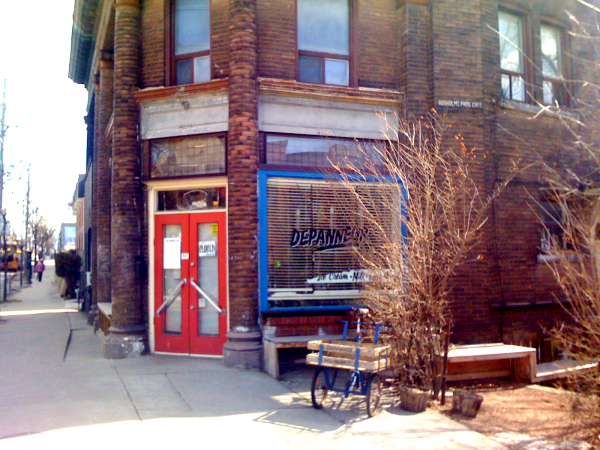
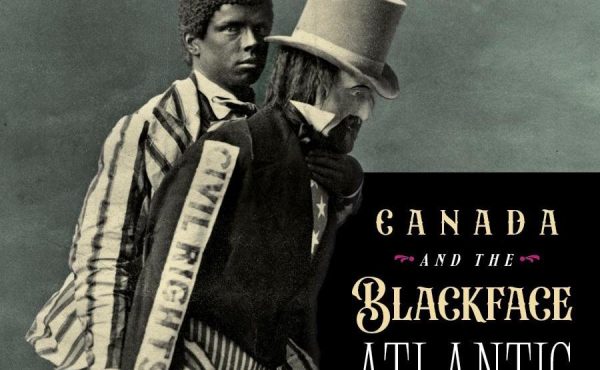
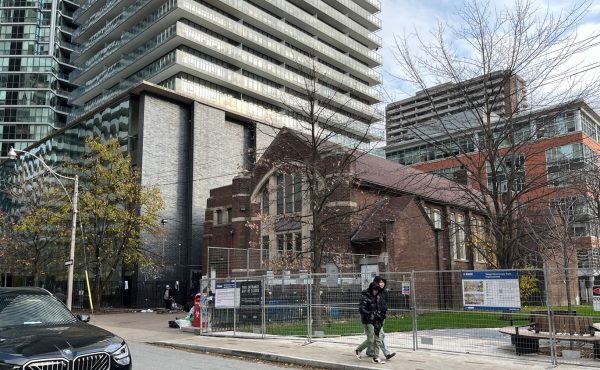

14 comments
Bonjour, Monsieur Rotsztain,
Félicitations pour votre article. Pourriez-vous me donner votre adresse courriel, pour que je puisse vous mettre sur notre liste de personnes à contacter pour la Société d’Histoire de Toronto. Nous avons un beau programme de visites guidées dans la ville ainsi que de conférence sur son histoire. C’est dommage que vous n’en ayez pas parlé!
Danièle Caloz
Great article. By the way, the correct word for “corner store” in Québécois French is dépanneur. Merci!
Bravo! et Merci! This article and recognition of Toronto’s francophone community is welcome (and overdue). Did you know that in 2015, Ontario will be celebrating 400 years of French presence? While the City of Toronto has over 53,000 francophones, there are actually 125,000 of us in the GTA. There are a range of groups and organizations offering services and events ‘en français’. I encourage readers to check out the website of Toronto’s francophone organization, http://www.acfo-toronto.com.
Btavo pour cet article. Toutefois, we should say ”Rue du Collège”, not ”Rue de Collège”.
Thanks Luisance — I changed the post to reflect this new-found grammar knowledge.
Hello Daniel,
and thank you for this great article about the French roots of our beautiful city.
I am going to be a French stereotype here, but I find it sad that, in an article on the subject of French, one of the only words in the featured language is wrongly spelt TWICE, especially when the right spelling is right there, above the text, in the picture :). Think of it as if you were an English speaker living in Paris and seeing the only word in English in an article about anglophones in the city misspelt : “convenniance stor”.
It’s “Dépanneur”, with only one P and two Ns, coming from the verb “Dépanner” which apparently doesn’t exist in English and means “to help by fixing a problem” and is usually applied to cars that broke down on the road or to people with needs, hence the parallel with “convenience”.
Apart from this little mishap, I really enjoyed reading you. 🙂
Zefred
Thanks Zefred.
I have corrected the spelling. I apologize for my critical error, and appreciate you letting me know. Of all the spelling mistakes…!
Hi! I’m Len, the owner of The Dépanneur. Coupla things: first off, thanks for the shout out. A bit of a back story on the name of my place: I was born in Montreal, and though I grew up in Toronto, I moved back to study after high school, and lived there for 8-9 years in the 90’s. Montreal’s many charms left a deep impression on me and when I took over an old corner store on College St., it seemed like the obvious thing to call it, as running out to “the Dep” was the common precursor to hanging out with friends in MTL (the fact that they sell inexpensive beer & wine may have something to do with this). I also thought the original meaning was germaine: if you’re driving down the street and your car breaks, you would be “en panne”: stuck, in trouble, in a jam, etc. The “de-panneur” would be be the person who helped you get un-stuck – a trouble-shooter or problem-solver that helps you out of a difficult situation. I felt that the food scene in Toronto was a bit “en panne”, and that perhaps I could help le dépanner. We do that by keeping things friendly, creative and decidedly un-fancy — we invite a different guest chef to make a different meal every weeknight, and host BYOB family-style dinner parties on the weekend — an homage to the creativity and warmth that permeated the social fabric of Montreal in the years that I lived there.
There is another French weekly newspaper in Toronto. It is called Le Métropolitain. http://Www.lemetropolitain.com. 905 790-3229.
Hi, félicitation!
Excellent article, we need more like this.
Jean-Rock Boutin
Co-fondateur et secrétaire
FrancoQueer
There is also an amazing festival to show the French Culture. It is called Franco-Fete and you can discover it every summer at Yonge & Dundas Square. This year is from July 4th to 6th.
http://www.franco-fete.ca
bravo! very good article… crazy that it has not being done before! too bad that you didn’t speak to us before. it’s been years that we wake up the francophones and francophiles with our morning show “y a pas deux matins pareils” on radio-canada. All the infos, culture and sports of toronto and south ontario!!!! 90.3 FM, 869 AM from 6 to 9 am!!!!
Bonjour Daniel!
Great article.! Did you know that Toronto also has a French Theatre? Théâtre français de Toronto (TfT) is a professional French-language theatre presenting repertoire as well as new work. While appealing to all lovers of French-language theatre, it contributes to the cultural and educational development of Toronto’s francophone community. In its forty-eight years, Théâtre français de Toronto (TfT) has become one of the most important French-language theatres outside of Québec, with nearly 240 productions to its name. Today, TfT has almost a thousand subscribers and welcomes nearly 11,500 spectators each season from all over the GTA and Southwestern Ontario.
In April 2005, TfT introduced surtitled performances allowing a wider audience to attend the company’s performances. Instead of being ghettoized as a French only theatre company, TfT decided to open its doors to everyone: it was an instant success. In fact, surtitled performances now sell out before the French only ones, they are a major attraction!
If you send me your email address, I will add you to my media list for openings and such.
Thanks again for your article, à bientôt!
Josée
Duranleau Communications | josee@duranleau.com
Thank you for this article.
Another popular meeting ground for the French speaking / Francophiles in Toronto are the Improv games presented by Les Improbables de Toronto.
Every second Tuesday , we present French Improv Comedy at “The Supermarket” in Kensington Market. Ever since the troupe was created, we have faithful followers that are present at almost every games and newcomers at every show!
Check it out!!
Georges Raymond